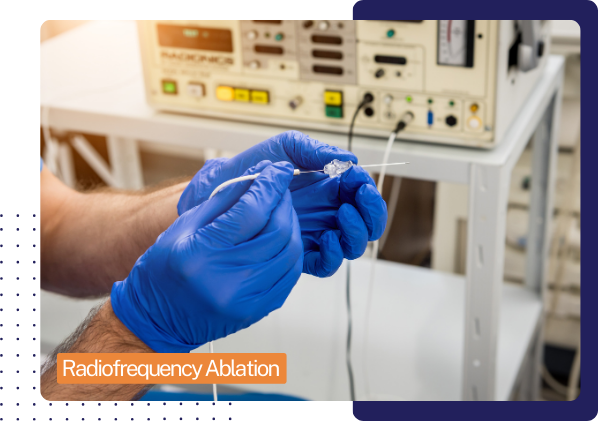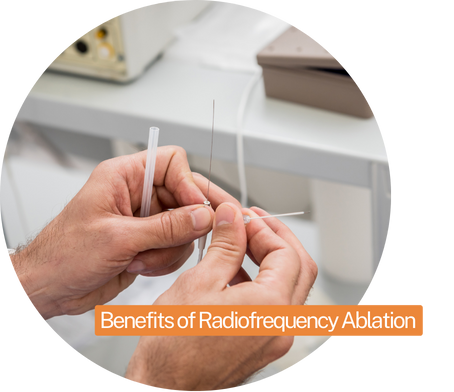Radiofrequency Ablation (RFA)
Radiofrequency Ablation (RFA) is a minimally invasive procedure designed to reduce pain by targeting specific nerve tissues. Using an electrical current generated by radio waves, RFA heats a small area of nerve tissue, effectively decreasing the pain signals sent from that area to the brain. This treatment offers significant relief by preventing pain signals from reaching the brain.

Conditions Treated with Radiofrequency Ablation:
- Knee Osteoarthritis
- Trigeminal Neuralgia
- SI Joint Pain
- Cancer Pain
- Pain in the Neck and Back
Make Your Appointment
Benefits of Radiofrequency Ablation:
- Avoid or Delay Surgery: RFA provides a non-surgical option for managing pain, potentially delaying or eliminating the need for more invasive procedures.
- Stop or Reduce Pain: This procedure effectively disrupts pain signals, offering significant relief for chronic pain conditions.
- Improve Function: By reducing pain, RFA can help restore function and improve your overall quality of life.
- Reduce Pain Medication: Patients often experience a reduction in the need for pain medications following RFA, leading to fewer side effects and a better quality of life.
- Safer with minimal to no side effects


Patient Testimonials
"Excellent place for pain relief, good doctors with great service."
Ms. Vijaya Lakshmi
"Thank you so much for the treatment and care shown. Dr. Ashiq Bg explained my health condition very nicely and treated me with both friendliness and professionalism. I truly appreciate the staff and hospital for listening to patients' problems in a very polite manner. I strongly recommend this as the best hospital."
Mr. Nani Babu
Effectiveness of Radiofrequency Ablation
The effectiveness of RFA can vary based on several factors, including the accuracy of the diagnosis, anatomical variations of the nerve, and the technique used. Some patients experience complete pain relief within 10 days of the procedure, while others may notice improvement after two to three weeks. If there is no relief even after three weeks, the procedure may need to be repeated, as it might not have been fully effective the first time.
Side Effects & Risks Involved
RFA is generally considered a safe and low-risk procedure. However, as with any medical treatment, some patients may experience side effects or complications. It is important to discuss potential risks and any concerns with your doctor before undergoing RFA to ensure that you are fully informed about the procedure.


